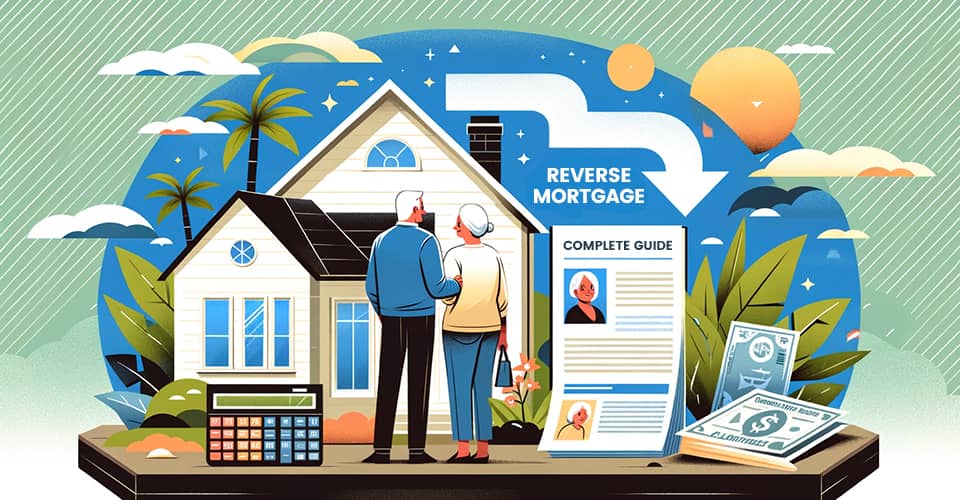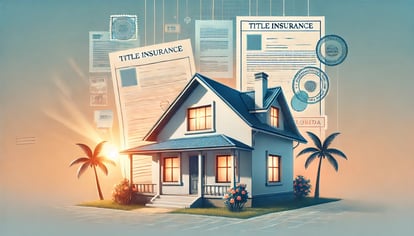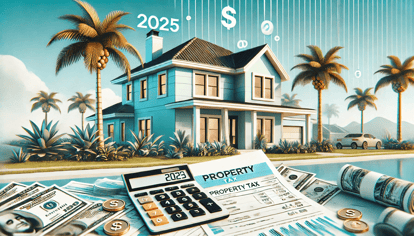The Complete Guide to Reverse Mortgages in Florida in 2025
What if your home could help fund your retirement without ever having to sell it?
A reverse mortgage is a loan that helps Florida homeowners aged 62 and older use their home's value to get money without selling it.
Verify Your Reverse Mortgage Eligibility
This money is tax-free and can give seniors more financial freedom and less stress in retirement.
In this guide, we’ll explain what reverse mortgages are, how they work, their benefits, and what to consider when paying them back.
What is a Reverse Mortgage?
A reverse mortgage is a loan for Florida homeowners aged 62 or older.
It lets seniors use the value of their home to get tax-free money without needing to sell their home or make payments to the lender.
Instead of making monthly payments, the lender sends regular payments to the homeowner based on the home’s value.
This can be helpful for people who need extra money but don’t want to worry about monthly bills or giving up their home.
With a reverse mortgage, you still own your home and can live in it as long as you keep up with property taxes and insurance.
These payments can help cover expenses and make life in retirement easier. It’s a simple way to turn your home’s value into extra income while staying in the place you love.
Verify Your Reverse Mortgage Eligibility
Quick Facts About Florida Reverse Mortgages in 2024
-
Average Age of Reverse Mortgage Borrowers in Florida: 62 years old (source: National Reverse Mortgage Lenders Association).
-
Average Loan Amount for Florida Reverse Mortgages: $125,000 (source: National Reverse Mortgage Lenders Association).
-
Florida's FHA Reverse Mortgage Limit: $970,800 (source: Federal Housing Administration).
-
Median Home Value in Florida: $325,000 (source: Florida Realtors®).
-
Percentage of Florida Homeowners 62+: 33% (source: U.S. Census Bureau).
- Florida's Reverse Mortgage Origination Share: 7% (source: National Reverse Mortgage Lenders Association).
Verify Your Reverse Mortgage Eligibility

How Does a Reverse Mortgage Work?
When it comes to understanding how reverse mortgages work, there are four key things you need to know.
No Repayment Required While Living in Your Home
With a reverse mortgage, you don’t have to make monthly payments as long as you live in your home.
You only repay the loan when the last borrower sells the home, passes away, or moves out for good.
The amount you owe gets bigger over time, but by law, you will never owe more than what your home is worth when the loan is repaid.
You still own your home and must pay property taxes, insurance, and keep the home in good condition. If these payments aren’t made, the lender may cover them with the loan or ask for the full loan to be repaid.
Full Repayment Due Upon Selling or Moving
With a reverse mortgage, you don’t have to repay the loan as long as you live in your home.
This loan lets homeowners use their home’s value to get money without selling the home or taking out a regular home equity loan.
The loan is repaid only when the last borrower passes away, moves out permanently, or sells the home. The repayment usually comes from selling the home or other assets.
The amount you owe grows over time because of interest, but you’ll never owe more than your home’s value when the loan is paid back. This gives borrowers peace of mind when considering a reverse mortgage.
You Receive Monthly Payments, Not Make Them
A reverse mortgage is a loan that sends you monthly payments instead of requiring you to make them.
This can be a big help for seniors on a fixed income, as the extra money can cover living expenses, medical bills, or other needs.
On average, homeowners receive around $1,000 to $5,000 a month, though the amount depends on factors like home value and age.
You can stay in your home for as long as you want, with no repayment required as long as you live there. The loan is only repaid when the last borrower passes away, moves out permanently, or sells the home.
While you don’t make monthly payments, the amount you owe will grow over time. However, you will never owe more than your home’s value when the loan is paid back, giving you financial security in retirement.
You Still Owe Taxes
With a reverse mortgage, you still own your home, which means you are responsible for paying property taxes, insurance, and repairs.
These costs can add up, so it’s important to plan for them in your budget. If you don’t keep up with these payments, the lender might use the loan to pay them or even ask you to repay the loan.
Even with these responsibilities, a reverse mortgage is a helpful tool for seniors who need extra money during retirement. You can use the funds for anything you need and keep living in your home.
By law, you will never owe more than your home is worth when the loan is repaid, so your heirs won’t be left with debt.
Verify Your Reverse Mortgage Eligibility
Benefits of a Reverse Mortgage
By choosing a reverse mortgage, you can take advantage of their many benefits.
With a Florida reverse mortgage, you may enjoy increased financial flexibility, peace of mind, and greater control over your retirement finances.
The following section will explore some of the many benefits a reverse mortgage can provide.
Retain Full Ownership of Your Home
One of the best things about a reverse mortgage is that you still own your home.
Some people think signing a reverse mortgage means giving the property to the lender, but that’s not true. The lender only holds a mortgage lien, not the title to your home.
As long as you follow the loan terms—like paying property taxes and insurance—the lender cannot take your home.
With no monthly payments required, you also avoid the risk of missing payments, letting you enjoy your retirement with peace of mind knowing your home is secure.
You Are Protected From the Housing Market
A reverse mortgage is a safe, government-regulated program that helps homeowners use their home’s value to get money.
Unlike regular loans, the balance on a reverse mortgage can grow over time and may even become more than the home’s value.
But there’s no need to worry—reverse mortgages are “non-recourse,” meaning you’ll never owe more than your home is worth.
Lenders cannot take any other assets to cover the loan, so you can use your home equity without risking your savings or belongings. This makes a reverse mortgage a secure option for homeowners who need extra funds.
Your Heirs Have Options
In Florida, your heirs have options for handling a reverse mortgage after you pass away. They can sell the home to pay off the loan and keep any remaining equity.
If they want to keep the home, they can refinance the loan balance instead.
Your heirs will never have to pay more than the home is worth because reverse mortgages are "non-recourse" loans. This means the lender can only collect what the home sells for, not from your heirs' personal assets.
A reverse mortgage can offer financial security for your family while giving them the freedom to choose the best option for their needs.
Stay in Your Home Your Whole Life
As you near retirement, you might think about downsizing, but leaving a home full of memories can be hard.
A reverse mortgage can help by letting you use your home’s value for extra funds without needing to sell or move.
This allows you to stay in your home, close to family and friends, while avoiding the hassle of buying or renting another place.
It’s a simple way to use the wealth in your home to support a comfortable and secure retirement.
Verify Your Reverse Mortgage Eligibility
The Types of Reverse Mortgages
There are three main types of reverse mortgages you need to know about. Each is for a unique situation, so you must decide which fits your needs.
Home Equity Conversion Mortgage
HECM Reverse Mortgages are a special type of reverse mortgage backed by the U.S. Department of Housing and Urban Development (HUD).
This loan lets homeowners aged 62 and older turn their home’s value into cash without making monthly payments.
HECM loans come with flexible repayment options and are protected by federal insurance, giving borrowers extra security if something goes wrong.
In Florida, homeowners can also benefit from programs like the Florida Reverse Mortgage Program, which offers added advantages for those interested in reverse mortgages.
Proprietary Reverse Mortgage
Proprietary reverse mortgages are loans from private lenders that let homeowners use their home’s equity.
These loans are not regulated by the Federal Housing Administration (FHA) or the U.S. Department of Housing and Urban Development (HUD).
You can use the funds for anything you need, like paying off debt, making home improvements, or adding to your retirement income.
Single-Purpose Reverse Mortgage
Single-purpose reverse mortgages are loans from local governments or nonprofits that let homeowners use their home’s equity for specific needs, like home repairs or property taxes.
Unlike proprietary reverse mortgages, which can be used for anything, single-purpose reverse mortgages have limits on how the money can be spent.
They are often cheaper than other reverse mortgages. For instance, Florida homeowners might use a single-purpose reverse mortgage to pay property taxes without the extra costs of traditional loans.
Verify Your Reverse Mortgage Eligibility
The 6 Ways You Can Receive the Proceeds
A reverse mortgage can give you financial freedom, but it’s important to know how you can receive the money.
You have six options: a lump sum at closing, a line of credit, monthly payments, a mix of these, or a delayed payment option.
Each choice has pros and cons, so think about your current needs and future plans before making a decision.
With careful planning, a reverse mortgage can be a helpful tool for securing your financial future.
Single disbursement lump sum
With this option, you get all your money in one payment from the lender.
The amount depends on your age, your home’s value, and the interest rate.
It’s a good choice if you need cash right away or want to pay off a big expense.
On average, borrowers receive around $60,000 to $200,000 with this payout.
Line of credit
With this option, you can take out money as needed, up to a set limit.
You only pay interest on the amount you use, and the unused portion grows over time.
This is a flexible choice for covering emergencies or unexpected costs.
On average, borrowers can access $50,000 to $150,000 with a reverse mortgage line of credit.
Term payment
With this option, you get equal monthly payments for a set period, which can be a few years or several decades.
It’s a good choice if you want steady income for a specific amount of time and don’t need all the money right away.
On average, borrowers receive monthly payments of $1,000 to $5,000 during the chosen term.
Life of the borrower (tenure)
With this option, you receive equal monthly payments for as long as you live in your home.
It’s a great choice if you want steady income and plan to stay in your home for the rest of your life.
On average, borrowers receive $800 to $3,200 per month with this option.
Modified term/line of credit
This option gives you monthly payments for a set time, and after that, you can use the remaining funds as a line of credit.
It’s a good choice if you need money right away for a short-term need but want to save some funds for future use.
On average, borrowers receive $1,000 to $3,500 per month during the term and have access to a line of credit ranging from $20,000 to $100,000 afterward.
Modified tenure/line of credit
Unlike the modified term option, this combines lifetime monthly payments with a line of credit for emergencies.
This option gives you monthly payments for as long as you live in your home, plus a line of credit for unexpected costs.
It’s a great choice if you want steady income but also need extra funds available for flexibility.
On average, borrowers receive $800 to $3,200 per month and have a line of credit ranging from $20,000 to $100,000.
Verify Your Reverse Mortgage Eligibility
When and How You Pay a Reverse Mortgage Back
With a reverse mortgage, the lender pays the homeowner a portion of their equity as a loan.
But when and how do you pay it back?
When do you pay back a reverse mortgage?
You’re not required to pay back a reverse mortgage until you sell your home or no longer use it as your primary residence.
This means that you don't need to make repayments as long as you live in your home and meet other specific requirements (such as maintaining the home and paying property taxes).
Instead, the loan balance increases over time, making it an option for seniors who don’t have a lump sum of money to repay a loan.
How do you pay back a reverse mortgage?
When it’s time to repay the loan, you or your heirs have a few choices:
-
Sell the home or refinance it to pay off the loan. If the home sells for more than what is owed, you or your heirs keep the extra money.
-
Pay the loan in cash using savings, life insurance, or other funds, and keep the home. If the loan amount is more than the home’s value, you or your heirs won’t have to pay the difference because the loan is non-recourse.
-
Give the home to the lender by signing it over. The lender will sell the home to repay the loan, but this option isn’t ideal since you or your heirs won’t get any money from the home. The lender might also sell it for less than it’s worth.
Why are reverse mortgage loans non-recourse?
Most reverse mortgage loans are non-recourse, meaning the lender can’t hold you or your heirs liable for additional debt when the total loan balance exceeds the home’s value.
This means you or your heirs don’t have to worry about using your other assets to satisfy the loan or get into additional debt.
How much will you need to pay back?
The amount you’ll need to repay depends on how much you’ve borrowed, and it grows over time with interest and fees.
If you plan to leave the home to your heirs, they can pay off the loan and keep the home, but the total balance may be much higher than the home’s original value.
The exact amount owed depends on factors like your home’s value, your age, and the loan’s interest rate. Since the balance grows over time, it’s important to keep track of what you owe.
When and how you repay the loan will depend on your situation. You can sell the home, pay it off while living there, or leave it for your heirs to handle.
Verify Your Reverse Mortgage Eligibility
Facts That You Need to Know
-
A reverse mortgage is a loan available to homeowners over 62 years of age that allows them to convert part of their home equity into cash without selling their home or making monthly mortgage payments.
-
The amount of money a borrower can receive from a reverse mortgage is based on factors such as the home's value, the borrower's age, and current interest rates.
-
There are several ways to receive funds from a reverse mortgage, including lump-sum distribution, line of credit, fixed term, life of the borrower (tenure), modified term, and modified tenure.
-
The loan must be repaid when the borrower moves out of the home, sells the property, or passes away. The loan balance will include the principal amount borrowed, accrued interest, and fees.
-
Borrowers are still responsible for paying property taxes and homeowners insurance and maintaining the property in good condition.
-
Reverse mortgages can provide a steady source of income for retirees and help them supplement their retirement savings.
-
Interest rates on reverse mortgages may be higher than traditional mortgage rates, which means that borrowers may end up owing more than the value of their home over time.
-
Borrowers must attend counseling sessions with a HUD-approved counselor before applying for a reverse mortgage to ensure that they understand the risks and benefits of the loan.
-
Reverse mortgages are non-recourse loans, which means that the borrower or their heirs will not be personally liable for any loan balance that exceeds the home's value at the time of repayment.
- Reverse mortgages can be a good option for some homeowners, but they are not suitable for everyone. Borrowers should consider their financial situation and consult with a financial advisor before taking out a reverse mortgage.
Verify Your Reverse Mortgage Eligibility
Bottom Line
Now that you know the basics of reverse mortgages in Florida, it’s time to take the next step.
MakeFloridaYourHome is here to guide you with personalized advice and resources.
We know this is an important decision, and we’ll be with you every step of the way.
With our help, you can feel confident in making the right choice for your future.
Don’t wait—contact us today and start your journey to a comfortable retirement in 2025!
With over 50 years of mortgage industry experience, we are here to help you achieve the American dream of owning a home. We strive to provide the best education before, during, and after you buy a home. Our advice is based on experience with Phil Ganz and Team closing over One billion dollars and helping countless families.

About Author - Phil Ganz
Phil Ganz has over 20+ years of experience in the residential financing space. With over a billion dollars of funded loans, Phil helps homebuyers configure the perfect mortgage plan. Whether it's your first home, a complex multiple-property purchase, or anything in between, Phil has the experience to help you achieve your goals.


 By
By  Edited by
Edited by 





